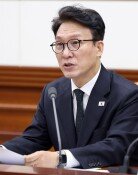CTWU Executives Subject to Obstruction of Justice
CTWU Executives Subject to Obstruction of Justice
Posted August. 25, 2003 21:41,
With the Cargo Transportation Workers` Union (CTWU) collective walkout, the Korean export industry has suffered more than 300million dollars of loss.
The Ministry of Commerce, Industry and Energy announced on Aug.25, In the cement, steel, tire and related industries, 338miillion dollars of export loss was incurred, as of Aug. 24, and added, If the truckers do not return to work by Aug.26, the amount of loss is expected to exceed 500million dollars. When the CTWU refused to operate in May, it incurred export loss of 540million dollars.
The number of containers moving through Busan Harbor dropped to below 50% of normal for the first time since the strike began on Aug.21, and the number plunged to 41% of average for Gwangyang Harbor. In case of the cement industry, inland transportation using cargo truck literally halted. Thus, the damage on construction industry is expected to fully materialize soon.
Some small-to-medium-sized trading companies are giving up on export, as they cannot find trucks to deliver their cargos even if they pay 2-3times higher rates.
A paper-manufacturing company D in South Jeolla Province, which could not ship export products last week, was anxious saying that if it fails to find a cargo truck by the weeks end, its buyers will file lawsuits against it. S machinery in Gwangju stopped factory operations, as it could not haul over the imported materials in Busan Harbor.
As the damages snowballed, the government discussed measures for it by holding a related ministers` meeting on Aug. 25 under the supervision of the Prime Minister Goh Kun. The government decided to strongly respond by applying the obstruction of justice law against the executives of the union and it also decided to increase the amount of cargo going through major harbors such as Busan Harbor, by injection of military personnel and equipments.
Meanwhile, the police arrested 10 union members of the Pohang Chapter who obstructed operation of non-member cargo trucks by stopping them with passenger cars. The police tightened its regulation on illegal interference in truck operation by such measures as filing for arrest warrants for five of them including Mr. Kwon(38).
According to the police, there were series of actions presumed to be carried out by the members of the union against cargo trucks of non-unionized drivers, such as broken windows and torn-off tiers.
Apart from it, in order to fundamentally resolve the recurring logistics crisis in Korea, the government decided on the early adoption of a Return to Work Order System against unjustified collective walkout of cargo truckers and the Driver Qualification System, which gives the government the power to suspend or terminate driver`s licenses.
Operators of container ships and cargo transportation companies rejected the proposal by the cargo union to resume negotiation, and insisted on return to work first, while the union adhered to the package settlement among all sectors, ranging from general cargo, container and BTC sectors. Thus, they could not find the way to resolve the situation, signaling that it could take longer to fix the crisis.
Meanwhile, the Ministry of Construction and Transportation announced on Aug. 25 that it would suspend petroleum subsidy on CTWU member trucks, if the workers do not follow the cargo transportation companies` demand to return to work by midnight of Aug. 26.
The government initially supported only up to 50% of increased amount in traffic taxes for gasoline, but it decided to compensate the full amount from July, after it signed an agreement with the union in May.







